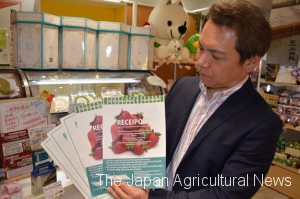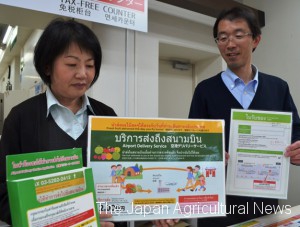
A man shows fliers offering information in languages such as English and Thai on a service to take over quarantine procedures for foreign travelers at Kansai International Airport in Osaka Prefecture.
TOKYO, April 17 – Increasing efforts are recently seen in regional areas to promote local farm produce to tourists from abroad, such as taking over the troublesome quarantine procedure for fruits or setting up a store which sells inspected farm produce at airports. Because quarantine requirements vary by country, providers of such services are seeking ways to promote local produce that respond to different needs.
Starfood Japan Co., a branding agency in the city of Wakayama which offer support to market local produce, began in 2017 the service of taking over the quarantine procedure for foreign travelers at Kansai International Airport so that they can take back home fruits grown in Wakayama Prefecture, including citrus fruits, peaches and strawberries.
Tourists can fill out an application form at hotels in the city of Osaka to make purchase orders for such fruits, which will be delivered from JA Kinosato, an agricultural cooperative in Wakayama, and receive quarantined product in four days at the earliest at the firm’s shop in the airport immediately before departure.

Sales staff at Tajima no Mahoroba, a roadside rest area in Asago, Hyogo Prefecture, show signboards explaining services for foreign tourists, including a duty-free counter and a delivery service.
Tajima no Mahoroba, a roadside rest area in Asago, Hyogo Prefecture, started in 2016 offering information on quarantine requirements, as well as a delivery service of products purchased at its farm produce store to Kansai International Airport at 2,000 yen a package.
The rest area is promoting the service to foreign tourists through travel agencies, specially targeting visitors from Singapore to buy local specialties like Tajima beef, since the country allows travelers to bring beef and pork from Japan without going through quarantine at airports if the products are for personal consumption and a simplified form of certificate is attached. “Foreign people who are tired of sightseeing in metropolitan areas are coming to regional areas,” said the manager of Tajima no Mahoroba. “We hope to promote local foods of the Tajima region along with harvesting experience.”
Chubu Centrair International Airport in Aichi Prefecture sells local specialties of the Chubu region, such as Crown melons grown in Shizuoka Prefecture and quarantined Matsusaka beef produced in Mie Prefecture, at a store inside the area restricted to passengers of international flights. About 70 or 80 percent of people who make purchases at the store are travelers from Hong Kong who can take most of the items home without going through quarantine procedures.
Last summer, peaches from Gifu and Nagano prefectures were sold at the store, with total sales reaching some 600 boxes, each with eight peaches, in roughly two months. “We offer a product lineup that suits the food culture and the taste of the target countries,” said an official in charge of sales and marketing.

